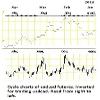- หน้าหลัก
- ชุมชน
- นักเทรดมือใหม่
- What is your trading strategy ?
Advertisement
Edit Your Comment
What is your trading strategy ?
Oct 27, 2017 at 10:14
เป็นสมาชิกตั้งแต่ Aug 11, 2017
870 โพสต์
The trading strategy is really important to make profit with consistency. Basically according to our trading understanding we the traders have to select our trading strategies. It would be really great if we choose the broker which is more appropriate to the concept of trading that will be used , the traders who are scalpers have to choose the broker which allows trading concept such as this.
เป็นสมาชิกตั้งแต่ Dec 03, 2017
1 โพสต์
Dec 03, 2017 at 08:03
เป็นสมาชิกตั้งแต่ Dec 03, 2017
1 โพสต์
That is quite true. However i believe if you a new forex trader, it is best to look into swing trading before scalping so that you have a better chance at no blowing your account while you perfect your strategy. Normally new traders have little to invest and they end up with accounts that have high spreads. one of the strategies I would advise for a new trader is trading on Divergence.
Trust your edge because the markets don't care about you
Dec 03, 2017 at 15:46
เป็นสมาชิกตั้งแต่ Oct 12, 2016
781 โพสต์
Choosing a trading system is very important since it is very subjective to the individual trader's trading psychology, risk tolerance and profit expectations and accordingly he has to choose the timeframe for trading as well as the type of trading system to use for his trading to meet all his requirements.
Artificial General Intelligence
เป็นสมาชิกตั้งแต่ Dec 11, 2015
1462 โพสต์
Dec 04, 2017 at 15:33
เป็นสมาชิกตั้งแต่ Dec 11, 2015
1462 โพสต์
I agree with all that has been said above. Also, I would add that when picking a strategy a trader should remember two things - that he shouldn't be afraid to switch out a strategy that is not working and that he shouldn't try to fix things that aren't broken.
Dec 05, 2017 at 07:51
เป็นสมาชิกตั้งแต่ Jun 14, 2013
127 โพสต์
I feel a trader's trading strategy should be a reflection if his/her personality and background.
If you like taking big risks and thrive in an intense, almost chaotic environment, then perhaps a scalping strategy will suit you best. People who tend to be more extroverted and and have a sense of adventure will probably do well with scalping. But be warned, scalping on a demo account is exciting and a lot of fun. Doing this on a live account if you are inexperienced will be a wild emotional roller coaster, and a recipe for disaster.
If you have a great knack for managing your personal finance and are well disciplined with your savings, you may prefer a safer less-risky swing-trading strategy on larger time-frames like the 4-hour or daily charts. Most new traders will benefit from learning the basics first and then developing a personal trading strategy using market swings on the larger time-frames. It should teach you the patience and discipline to wait for the market to approach key support/resistance levels before entering or exiting a trade.
Then of course you have the investors. If you have a background in finance or business and understand the details of macro economics, then long investments would probably suit you best. Investing is more the art of analyzing economic and geo-political data to make investment decisions. Of course you will have to have substantial funds in you account, and be prepared to stick with your trades for weeks, months or even a few years.
Your background (work, social life) may also be key to understanding which trading strategy will suit you best. An engineer would enjoy the challenge of technical analysis, while an economist may prefer fundamental analysis. How much time do you have at your disposal? Limited time may warrant a "set-and-forget" strategy like swing-trading. Scalping or active short-term swing trading requires more time. Are you trading part-time (do you have a day-job) or full-time?
I'm fortunate in that I work for myself. I have a small software development business. So basically I work from home on my projects, and it allows me to trade full-time. Due to my background as a programmer I prefer technical analysis over fundamental analysis, but I still prefer a swing-trading strategy. I also am constantly working on an automated system (EA's) to implement my manual trading strategy on my own web server (I develop eCommerce websites for my clients).
The point I'm trying to make here is this. You have to ask yourself a lot of questions regarding your personality, professional background, family life, available time, etc., and then sit and carefully decide which type of strategy will suit you best. Someone else's strategy may not work for you at all.
And take the advice from someone who paid his school fee's in trading. Over the last 7 years of doing this I realized that a trading strategy is not as important as a well developed trading plan. You will face many challenges in your trading career, try out many different trading strategies, face many emotions related to profits and losses. The only thing that can keep you profitable long-term, keep your sanity and not allow you to give up or worse blow up your account(s), is a trading plan. Think of it this way, the ONLY people who consistently make money in the long term, are people who treat trading as a business. And any successful business, anywhere in the world, has a well defined business plan. So your trading plan should be, in essence, your business plan.
Profitable trading all!!
If you like taking big risks and thrive in an intense, almost chaotic environment, then perhaps a scalping strategy will suit you best. People who tend to be more extroverted and and have a sense of adventure will probably do well with scalping. But be warned, scalping on a demo account is exciting and a lot of fun. Doing this on a live account if you are inexperienced will be a wild emotional roller coaster, and a recipe for disaster.
If you have a great knack for managing your personal finance and are well disciplined with your savings, you may prefer a safer less-risky swing-trading strategy on larger time-frames like the 4-hour or daily charts. Most new traders will benefit from learning the basics first and then developing a personal trading strategy using market swings on the larger time-frames. It should teach you the patience and discipline to wait for the market to approach key support/resistance levels before entering or exiting a trade.
Then of course you have the investors. If you have a background in finance or business and understand the details of macro economics, then long investments would probably suit you best. Investing is more the art of analyzing economic and geo-political data to make investment decisions. Of course you will have to have substantial funds in you account, and be prepared to stick with your trades for weeks, months or even a few years.
Your background (work, social life) may also be key to understanding which trading strategy will suit you best. An engineer would enjoy the challenge of technical analysis, while an economist may prefer fundamental analysis. How much time do you have at your disposal? Limited time may warrant a "set-and-forget" strategy like swing-trading. Scalping or active short-term swing trading requires more time. Are you trading part-time (do you have a day-job) or full-time?
I'm fortunate in that I work for myself. I have a small software development business. So basically I work from home on my projects, and it allows me to trade full-time. Due to my background as a programmer I prefer technical analysis over fundamental analysis, but I still prefer a swing-trading strategy. I also am constantly working on an automated system (EA's) to implement my manual trading strategy on my own web server (I develop eCommerce websites for my clients).
The point I'm trying to make here is this. You have to ask yourself a lot of questions regarding your personality, professional background, family life, available time, etc., and then sit and carefully decide which type of strategy will suit you best. Someone else's strategy may not work for you at all.
And take the advice from someone who paid his school fee's in trading. Over the last 7 years of doing this I realized that a trading strategy is not as important as a well developed trading plan. You will face many challenges in your trading career, try out many different trading strategies, face many emotions related to profits and losses. The only thing that can keep you profitable long-term, keep your sanity and not allow you to give up or worse blow up your account(s), is a trading plan. Think of it this way, the ONLY people who consistently make money in the long term, are people who treat trading as a business. And any successful business, anywhere in the world, has a well defined business plan. So your trading plan should be, in essence, your business plan.
Profitable trading all!!
Keep it simple, be disciplined, get rich slowly and above all protect your equity!
เป็นสมาชิกตั้งแต่ Dec 08, 2017
12 โพสต์
เป็นสมาชิกตั้งแต่ Dec 10, 2017
210 โพสต์
เป็นสมาชิกตั้งแต่ Feb 22, 2011
4573 โพสต์
Dec 12, 2017 at 07:55
เป็นสมาชิกตั้งแต่ Feb 22, 2011
4573 โพสต์
One word:
DIVERSIFICATION:
I have learnt the stony road that you need to diversify risk across multiple
- pairs
- brokers
- trading systems
Never ever put all eggs in one basket. Anything could happen on Forex.
DIVERSIFICATION:
I have learnt the stony road that you need to diversify risk across multiple
- pairs
- brokers
- trading systems
Never ever put all eggs in one basket. Anything could happen on Forex.
เป็นสมาชิกตั้งแต่ Feb 22, 2011
4573 โพสต์
Dec 18, 2017 at 09:51
เป็นสมาชิกตั้งแต่ Feb 22, 2011
4573 โพสต์
You need to have defined trading plan before trading
Trading plan should at least cover
- rules for opening positions
- rules for exiting positions
- money management
It does not really depend what indicators or kind of entry you use but it has to work for you.
Trading plan should at least cover
- rules for opening positions
- rules for exiting positions
- money management
It does not really depend what indicators or kind of entry you use but it has to work for you.
เป็นสมาชิกตั้งแต่ Feb 22, 2011
4573 โพสต์
Dec 19, 2017 at 15:48
เป็นสมาชิกตั้งแต่ Feb 22, 2011
4573 โพสต์
Hildur posted:
If your rules are really that strict then you could develop a robot to do it for you
I have developed such robots of course
Feb 22, 2018 at 11:13
เป็นสมาชิกตั้งแต่ Aug 11, 2017
870 โพสต์
For making profit with consistency we the traders have to depend on our trading strategies that we select according to our trading experience, for creating a successful trading strategy we have to make first of all the proper money management policy , otherwise that’s not possible at all to make profit despite of good trading approach .
เป็นสมาชิกตั้งแต่ Mar 26, 2018
29 โพสต์
Aug 31, 2018 at 07:15
เป็นสมาชิกตั้งแต่ Mar 26, 2018
29 โพสต์
Mohammadi posted:
The trading strategy is really important to make profit with consistency. Basically according to our trading understanding we the traders have to select our trading strategies. It would be really great if we choose the broker which is more appropriate to the concept of trading that will be used , the traders who are scalpers have to choose the broker which allows trading concept such as this.
Trading strategies we recommend, if you start trading forex:
- The Best Macd Trend Follow Strategy
- Trend Following Plan for Trading
- Chart Patterns Step By Step Guide
Aug 31, 2018 at 14:05
เป็นสมาชิกตั้งแต่ Aug 19, 2013
23 โพสต์
togr posted:Hildur posted:
If your rules are really that strict then you could develop a robot to do it for you
I have developed such robots of course
Hi. What is the safety of such EAs like? Can staff at a hosting company still your intellectual property? Are you the only one who has access to it and can we be sure?

*การใช้งานเชิงพาณิชย์และสแปมจะไม่ได้รับการยอมรับ และอาจส่งผลให้บัญชีถูกยกเลิก
เคล็ดลับ: การโพสต์รูปภาพ/youtube url จะฝังลงในโพสต์ของคุณโดยอัตโนมัติ!
เคล็ดลับ: พิมพ์เครื่องหมาย @ เพื่อป้อนชื่อผู้ใช้ที่เข้าร่วมการสนทนานี้โดยอัตโนมัติ


















